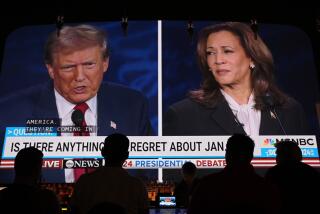Court Reinstates Political Ad Case Against Developer
- Share via
In a significant ruling that may affect future federal election campaigns, the U.S. 9th Circuit Court of Appeals on Friday tightened federal election laws that apply to campaign statements filed by individuals who make independent expenditures on behalf of or against a candidate.
The appeals court, in a ruling released in Pasadena, reversed a 1983 decision in San Diego by U.S. District Judge Gordon Thompson, who dismissed a lawsuit filed against local developer Harvey Furgatch for allegedly violating federal election laws.
In November, 1983, Thompson dismissed suits filed by the Federal Election Commission against Furgatch and investment broker J. David (Jerry) Dominelli. The FEC sued the pair for failing to file FEC reports when they purchased three newspaper advertisements a few days before the Nov. 4, 1980, presidential election.
Friday’s unanimous appellate ruling applied only to Furgatch, who purchased full-page advertisements in the New York Times and Boston Globe within a week of the 1980 election. The ads, which cost Furgatch $25,000, urged voters not to allow “four more years of incoherences, ineptness and illusion” if President Jimmy Carter were reelected.
Furgatch, a San Diego County millionaire land developer, played a key role in the unsuccessful 1980 presidential campaign of ex-Gov. Edmund G. Brown Jr. Brown, like Carter, is a Democrat.
The ruling by Justices Alfred T. Goodwin of Pasadena and Jerome Farris of Seattle, and U.S. District Judge Gus Solomon of Oregon, who was on the court by designation, sets a new standard for federal courts to follow when interpreting the section of the Federal Election Campaign Act that requires all ads that “expressly advocate” the election or defeat of a candidate to be reported to the FEC.
Under the law, all independent expenditures of $250 or more must be filed with the FEC if the individual is “expressly advocating the election or defeat of a clearly identified candidate.” Until Friday’s 9th Circuit ruling, the law remained vague and ambiguous because the federal courts had not clearly defined what constitutes expressed advocacy.
Furgatch’s defense at a 1983 hearing was based on his argument that while the ads could be interpreted as being critical of Carter, they were also sufficiently vague and ambiguous because they did not come out and call directly for Carter’s defeat.
The FEC sued Furgatch in March, 1983, for failing to file election expenditure reports for the purchase of the ads and failing to include a disclaimer in the notice that appeared in the Boston Globe. The advertisement in the New York Times included a disclaimer saying that the notice was purchased by Furgatch and not authorized by any candidate.
In dismissing the FEC suit, Thompson ruled that the ads “did not expressly” advocate a particular election result or Carter’s defeat. Thompson based his ruling largely in the message “Don’t let him do it” which appeared in bold print in the notice. Thompson ruled that “it” could be construed to mean Carter’s degradation of his office and manipulation of the campaign process, as alleged in the advertisements’ message.
However, the justices ruled that “Don’t let him do it” is a command that “reasonable minds could not dispute . . . is urging readers to vote against Jimmy Carter.” The court also found that the “timing of the appearance of the advertisement less than a week before the election left no doubt of the action proposed.”
In addition, the ad was not “issue-oriented speech” protected by the First Amendment but intended as a personal attack against Carter in a way that advocated his defeat and not a criticism of his stand on issues.
“We have no doubt that the ad asks the public to vote against Carter,” wrote the justices in an 18-page opinion. They said that it was Furgatch’s intent that voters reject Carter and the ad encouraged that action. While the notice may have been “evasively written,” the justices said, it failed to express an appropriate call to action.
“We hold, however, that this failure to state with specificity the action required does not remove political speech from the coverage of the Campaign Act when it is clearly the kind of advocacy of the defeat of an identified candidate that Congress intended to regulate,” the justices wrote.
Attorneys for Furgatch could not be reached for comment late Friday, so it is not known whether they will appeal the ruling. FEC attorneys also could not be reached for comment. If the appellate court’s ruling stands, Furgatch would be required to file a statement and pay $25,000 in penalties, the cost of the ads in question.
More to Read
Get the L.A. Times Politics newsletter
Deeply reported insights into legislation, politics and policy from Sacramento, Washington and beyond. In your inbox three times per week.
You may occasionally receive promotional content from the Los Angeles Times.










